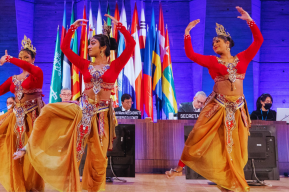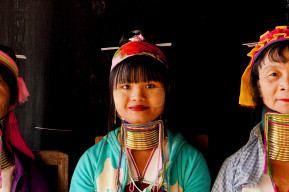News
Culture in the 2030 Agenda
The International Dimension of Culture
Culture is not only a sector of activity in itself, but also a transversal, intrinsic component across the public policy spectrum, acting as an enabler to accelerate sustainable development processes. While culture does not have a dedicated Sustainable Development Goal (SDG) in the 2030 Agenda, it is reflected across many of the goals and targets including those on sustainable cities (SDG 11), decent work (SDG 8), reduced inequalities (SDG 10), climate action (SDG 13), gender equality (SDG 5), innovation (SDG 9), and peaceful and inclusive societies (SDG 16).
This transversal dimension of culture in public policy-making is increasingly reflected in the Voluntary National Reviews submitted by Member States. These reports, which countries are invited to provide to monitor their progress in the achievement of the SDGs, are key indicators of public policy priorities and commitments at country level, and draw a global picture of the ways in which countries envision a more sustainable future. Out of the 205 reports submitted between 2016 and 2020, some 119 made substantive reference to culture in relation to all 17 SDGs, highlighting the growing recognition of the transversal role of culture for sustainable development by the Member States themselves.
Each month, this section presents a selection of initiatives on a particular theme to highlight the transversal role of culture in public policy. Of all the VNRs submitted from 2016-2020, around a third of countries mention an international dimension to their cultural policies. This month, we extract some innovative examples of how they are harnessing culture in diplomatic strategies or for international solidarity.

Cultural Diplomacy to Advance Partnerships and Peacebuilding
For the United Arab Emirates, the Expo 2020 (since postponed) is an important national priority for international exchange “showcasing innovation and culture”. Since 2010, the Omani Programme for Cultural and Scientific Cooperation offers students from several other countries the opportunity to study in the country's public and private higher education institutes. Andorra every two years brings together painters from around the world for an artistic workshop (organized through the National Commission since 2008) called Art Camp and Serbia also promotes the mobility of artists. Qatar aims to promote inter-civilization dialogue, the coexistence of different religions and cultural exchanges with Arab countries, in particular. The significance of hosting the European “Capital of Culture” is highlighted by Malta and Serbia, and Bahrain draws attention to its hosting of the “Capital of Islamic Culture.” Greece cites a 2015 conference on "Religious and Cultural Pluralism and Peaceful Coexistence in the Middle East", which focused on violent extremism against religious and cultural communities, and the deliberate destruction and looting of religious and cultural heritage. The conference resulted in the establishment of the Centre for Religious Pluralism in the Middle East. Kenya draws attention to its role in implementing culture for peace and conflict-resolution component of the Peace-Keeping Mission in Somalia.
Building Strong Cultural Institutions Through Shared Expertise and Training
Cyprus cites cooperation through a permanent regional organization. Under its Chairpersonship of the Committee of Ministers of the Council of Europe (November 2016-May 2017), Cyprus supported the development of the new Convention of the Council of Europe on Offences relating to Cultural Property. It also set up in 2012 an informal network of Law Enforcement Authorities and Expertise in the Field of Cultural Goods, aiming to tackle the illicit trafficking of cultural goods at a national and European level. Morocco highlighted the support of the Spanish Cooperation Programme in the development a reference guide on mechanisms to combat illicit trafficking in cultural property, as well as training sessions organized to raise awareness among Moroccan civil servants. Switzerland also highlights its commitment to combatting the illicit traffic of cultural property.
Safeguarding Heritage and Empowering Communities
Brunei Darussalam cites the Heart of Borneo Initiative, a trans-boundary cooperation project in cooperation with the Republic of Indonesia and Malaysia to conserve natural heritage. Honduras mentions an initiative that encourages inclusive participation of indigenous people to ensure sustainable development and the protection of natural and cultural heritage in the country’s eastern Mosquitia region, in collaboration with the region’s Unit of Indigenous and Black Peoples, the UN, Germany and the Swiss Confederation. Meanwhile, the Government of Liberia reported the signature of a Memorandum of Understanding with the civil society organization Global Ecovillage Network for an initiative for the regeneration of natural environments, the preservation of cultural heritage and the improvement of the livelihoods of various communities.
Culture Progressing in Official Development Aid Strategies
The Netherlands refers to projects it supports on cultural diversity, natural and cultural heritage, and digital heritage, as well as its intention to extend its Official Development Assistance (ODA) to projects regarding underwater heritage. Andorra cites musical, artistic and cultural education work in Madagascar, whilst Slovakia highlights a project to develop youth skills in Georgia (including traditional arts, crafts, organic agricultural business and entrepreneurial skills). Estonia mentions three transboundary projects that aim to empower women through handicraft production. Slovenia highlights its financing of schooling and mediation projects in post-conflict areas of Bosnia-Herzegovina targeted at building a culture of peace, intercultural dialogue and constructive conflict resolution. Hungary targets its ODA on the reconstruction of Christian temples and shrines in the Middle East, as well as the refurbishment of educational and cultural institutions in Ukraine through the Eastern Partnership Programme. Malta underscores its Masters scholarships for Palestinian students in Cultural Heritage Management, launched in 2014. Meanwhile, Canada highlights a contribution made to UNESCO’s Heritage Emergency Fund, that reaffirms “Canada’s commitment to the protection of cultural heritage and pluralism in armed conflict”.
Two further countries report on support received from international funds: Bulgaria has received support from the European-Bulgarian Sustainable Cities Fund for an urban development and cultural heritage initiative, while North Macedonia cites the Green Climate Fund set up by the United Nations Framework Convention on Climate Change (UNFCC), which has as concrete priorities forestry and cultural heritage protection and preservation.
UNESCO's conventions: Shared Landmarks to Advance Sustainable Development
The UNESCO Cultural Conventions are first and foremost intended as shared instruments to bring together the international community around a set of core concepts and values, reflecting a transformative and humanistic vision of societies. These normative instruments establish fundamental principles of equality and solidarity, which provide common references and standards that result from a worldwide collaborative process. The federating power of these normative instruments is acknowledged by the countries through their regular mention of UNESCO Culture Conventions in the VNRs. Twenty-one countries thus report on their engagement in the UNESCO Culture for Development Indicators (CDIS) and three countries referred to the ratification of international normative instruments related to culture. Furthermore, Bangladesh, Bulgaria and the Republic of Moldova mention intangible cultural heritage related projects. Bulgaria, Democratic Republic of Congo, Kyrgyz Republic, Micronesia, North Macedonia and Ukraine mention natural heritage culture-related projects or sites in the World Heritage List and another four Bulgaria, Morocco, the Republic of Moldova and the Syrian Arab Republic make direct reference to UNESCO Conventions.




